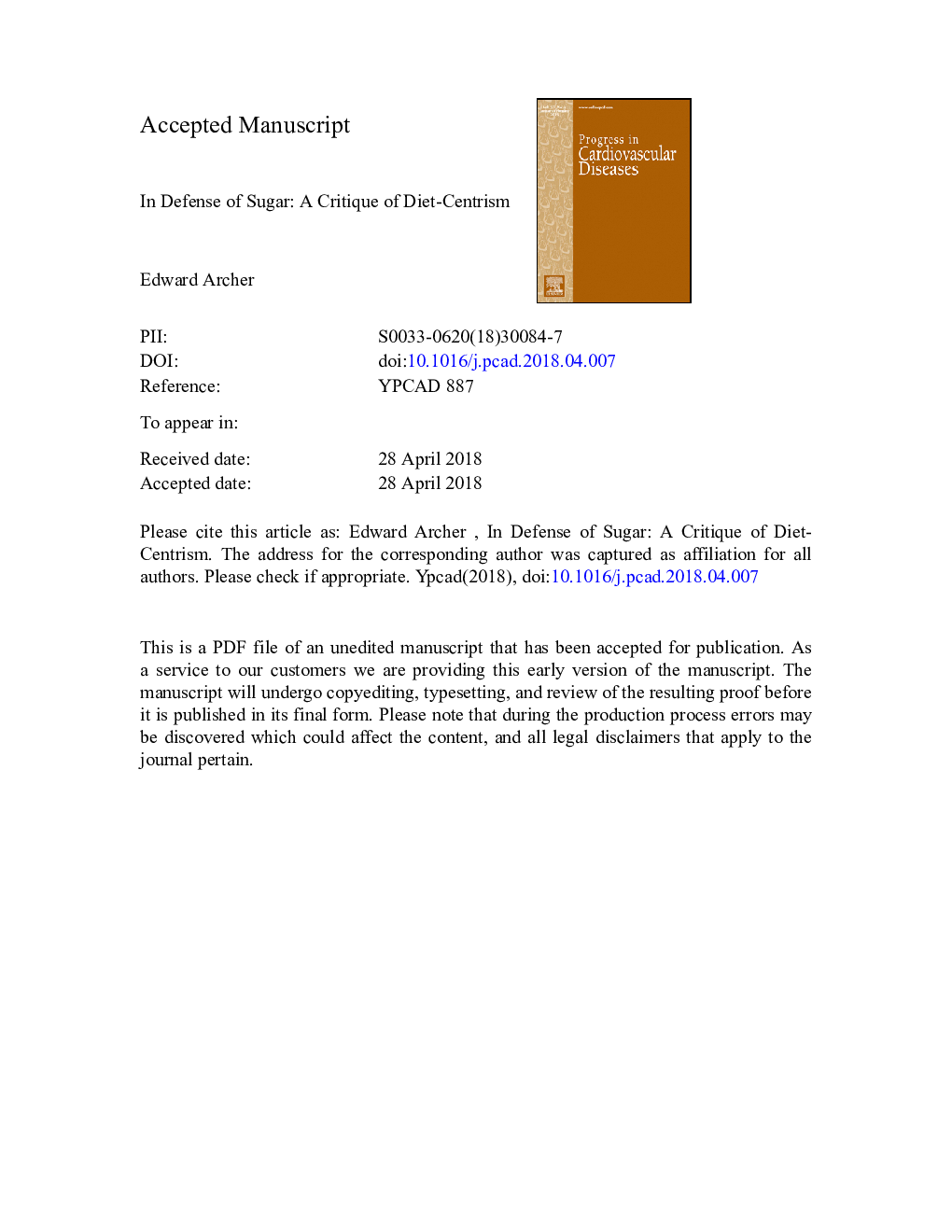| کد مقاله | کد نشریه | سال انتشار | مقاله انگلیسی | نسخه تمام متن |
|---|---|---|---|---|
| 8675207 | 1578918 | 2018 | 34 صفحه PDF | دانلود رایگان |
عنوان انگلیسی مقاله ISI
In Defense of Sugar: A Critique of Diet-Centrism
ترجمه فارسی عنوان
در دفاع از شکر: انتقاد از رژیم غذایی
دانلود مقاله + سفارش ترجمه
دانلود مقاله ISI انگلیسی
رایگان برای ایرانیان
کلمات کلیدی
T2DMNCDsSSBs - SSBUnited States - ایالات متحده آمریکاNon-communicable diseases - بیماری های غیر مسریNutrition - تغذیهType II diabetes mellitus - دیابت نوع دومDiet - رژیم غذاییWorld Health Organization - سازمان بهداشت جهانیPublic policy - سیاستگذاری عمومیPhysical activity - فعالیت فیزیکیSugar - قندMetabolism - متابولیسم Obesity - مرض چاقیSugar-sweetened beverages - نوشیدنی های شیرین شکرWHO - که
ترجمه چکیده
شکر ها به حیات بیولوژیکی پایه گذاری شده و در بسیاری از تاریخ ثبت شده نقش مهمی در تکامل انسان و الگوهای رژیم غذایی ایفا می کنند. گلوکز قند ساده بسیار مهم است برای سلامت انسان که یکی از داروهای ضروری سازمان بهداشت جهانی است. با توجه به این حقایق، هر دو منطق و بخش بزرگی از شواهد علمی را ادعا می کند که قارچ ها و سایر مواد مغذی که نقشی اساسی در بهبود قابل ملاحظه ای در طول زندگی و سلامت طی قرن گذشته بازی می کنند، ناگهان مسئول افزایش شیوع از چاقی و بیماری های غیر مزاحم مزمن. بنابراین، هدف این بررسی تهیه یک چالش جدی مبتنی بر شواهد به «رژیم غذایی مرکزی» و مقابله با بیماری قند رژیم غذایی است. اصطلاح "رژیم غذایی" متجلی است که تمایل ناخودآگاه هم محققان و هم عمومی را به خود جلب می کند و نتایج منفی سلامت را منحصرا به عوامل رژیم غذایی منعکس می کند و در عین حال نقش مهم و محرمانه تفاوت های فردی در مواد مغذی- متابولیسم ترکیب صریح مصرف غذا با هر دو وضعیت تغذیه ای و سلامت ذاتی در «رژیم غذایی» منعکس کننده این واقعیت است که بدن انسان یک سیستم بیولوژیکی پیچیده است که در آن اثرات عوامل رژیم غذایی بستگی به وضعیت فعلی این سیستم دارد. بنابراین، مغذی ها نمی توانند سلامت یا اثرات متابولیکی را مستقل از زمینه فیزیولوژیکی فرد مصرف کننده (مثلا سطح فعالیت فیزیکی) داشته باشند. بنابراین، با توجه به هیپربول غریبانه اطراف قندهای رژیمی، من یک موقعیت دفاعی را در اختیار می گیرم و شواهد زیادی از چندین دامنه را نشان می دهد تا نشان دهد که رژیم غذایی ضروری اما بی اهمیتی در سلامت متابولیک است و رژیم ضد قند به سادگی رژیم غذایی است. محرک مرکزی که ناشی از بیسوادی فیزیولوژیک است. موضع من این است که قندهای رژیم مسئول چاقی یا بیماریهای متابولیکی نیستند و مصرف قندهای ساده و پلیمرهای قند (به عنوان مثال، نشاسته) تا 75 درصد کل کالری روزانه در افراد سالم بی خطر است.
موضوعات مرتبط
علوم پزشکی و سلامت
پزشکی و دندانپزشکی
کاردیولوژی و پزشکی قلب و عروق
چکیده انگلیسی
Sugars are foundational to biological life and played essential roles in human evolution and dietary patterns for most of recorded history. The simple sugar glucose is so central to human health that it is one of the World Health Organization's Essential Medicines. Given these facts, it defies both logic and a large body of scientific evidence to claim that sugars and other nutrients that played fundamental roles in the substantial improvements in life- and health-spans over the past century are now suddenly responsible for increments in the prevalence of obesity and chronic non-communicable diseases. Thus, the purpose of this review is to provide a rigorous, evidence-based challenge to 'diet-centrism' and the disease-mongering of dietary sugar. The term 'diet-centrism' describes the naïve tendency of both researchers and the public to attribute a wide-range of negative health outcomes exclusively to dietary factors while neglecting the essential and well-established role of individual differences in nutrient-metabolism. The explicit conflation of dietary intake with both nutritional status and health inherent in 'diet-centrism' contravenes the fact that the human body is a complex biologic system in which the effects of dietary factors are dependent on the current state of that system. Thus, macronutrients cannot have health or metabolic effects independent of the physiologic context of the consuming individual (e.g., physical activity level). Therefore, given the unscientific hyperbole surrounding dietary sugars, I take an adversarial position and present highly-replicated evidence from multiple domains to show that 'diet' is a necessary but trivial factor in metabolic health, and that anti-sugar rhetoric is simply diet-centric disease-mongering engendered by physiologic illiteracy. My position is that dietary sugars are not responsible for obesity or metabolic diseases and that the consumption of simple sugars and sugar-polymers (e.g., starches) up to 75% of total daily caloric intake is innocuous in healthy individuals.
ناشر
Database: Elsevier - ScienceDirect (ساینس دایرکت)
Journal: Progress in Cardiovascular Diseases - Volume 61, Issue 1, MayâJune 2018, Pages 10-19
Journal: Progress in Cardiovascular Diseases - Volume 61, Issue 1, MayâJune 2018, Pages 10-19
نویسندگان
Edward Archer,
